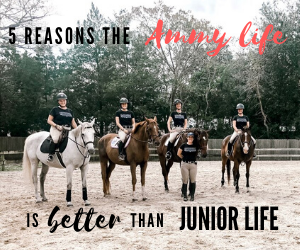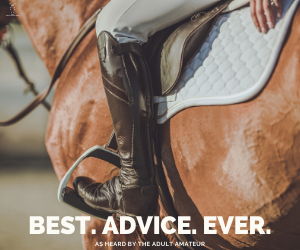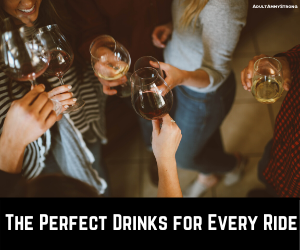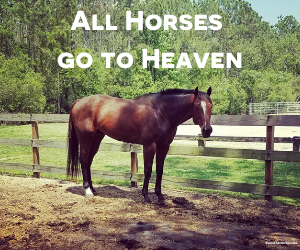|
Getting in the saddle as an adult -- either after some time off from your junior years due to the 'real' world, or swinging your leg over for the first time -- can fill your mind with lots of thoughts, insecurities, and 'what if's.' Negative and nervous thoughts along with other manifested fears can have a major impact on your riding, whether that be in the show ring riding that long approach to a single oxer (my long-time nemesis!), or out on the trails with your best friends. Sports psychology has become a much more widely used theorem and I was lucky enough to pick the brain of one of the best in the business, mental skills coach, Tonya Johnston, who herself is a competitive adult amateur hunter rider.
avoid? How do you move on from a mistake?" The answers to these questions all require a foundation of self-awareness first, and a variety of other mental skills (whether trained or more organically derived) second." Before a show or a ride, how do you feel? Nervous? Excited? Anxious? All three?! I know I typically like to think about a few goals I have for my rides -- what I want to work on most (if it's a lesson) or what do I want to accomplish in the show ring: do I want to use my seat more before the jump, work on staying deep into the corner to better prepare for the next jump or line -- but no matter how many times I go over what I want to execute well, when I get on and am at the ring, occasionally my mind can blank and I begin to get nervous, even if I know we've schooled well and are prepared. There are a few things you can teach yourself to do before these feelings have the chance to interfere with your ride. I asked Tonya how she would describe a healthy pre-ride or show routine. She replied, "I often tell people who have an understanding of their personal mental skills that the best pre-ride routine is whatever they think it is. A healthy routine is one in which a rider respects their own needs and stays dedicated to it no matter what environment they are riding in that day. Having said that, there are some areas that are valuable to address if possible."
"A healthy routine is one in which a rider respects their own needs and stays dedicated to it no matter what environment they are riding in that day." Those are all great things we can do to help keep our mental skills strong and our mind on track. Have you ever thought about adding these to your pre-ride or pre-show repertoire? I know the energy management is something that continues to works for me, especially ringside at a show. Deep breaths and self-talk reassure me that I'm as prepared as I can be for walking into the ring and putting in a consistent round. After what Tonya said riders can do as a healthy pre-ride/show routine, I asked her about what she's seen hold adult riders back from reaching their goals or potential. Her response resonated with me more than I could have ever expected... Johnston began, "I think adult amateurs face an ever-increasing challenge to remain in the moment and keep it simple. With an often-tricky riding/work/family balance (and even more connectivity to each of these worlds through electronics) it is increasingly difficult to 'be here now.' When amateurs juggle and adjust priorities to get to ride it can create an added pressure to make it all count." Sounds like my life summed up in a few sentences! She added, "This can lead to over-analysis of the past (“What happened when ____?”) and future (“What if _____?”) It is important to accept what is and set yourself up to use all of your talents -- both mental and physical -- by staying in the present when you are with your horse." I know I am one hundred percent GUILTY of over analyzing during lessons. Going into a four-stride to a two-stide line that I know Wow stopped at previously, I can over-think the ride the next time though and think "what if he stops again?" Which typically doesn't end well. We all want to be successful but with over thinking and over analyzing the past and what may happen can stunt any progress we've made. "Everyone has to define success on his or her own terms. Setting personal goals is a key to this process," said Johnston. "Learn how to connect [to] your horse on a deeper level, riding more effectively and consistently, handling pressure -- all of these are examples of wonderful successes. I see growth as success. Winning is nothing but icing on the cake." We've talked about what riders can do to increase their mental game, but how much of those mental skills comes from within and how much is perpetuated by outside factors? Far and wide this topic has filled many, many psychology books and sparks an endless debate. "Suffice to say," Johnston said, "that I give the edge to you, each and every one of you, to create and develop your own mental strengths." Ok. so if it's up to me to work on my own mental strengths, I asked Tonya what's the best advice she'd give an adult amateur needing to work on their mental skills. She said, "First of all, develop a fascination with your best qualities and your most amazing riding moments. There is so much to be learned from your successes, no matter how big or small they are, and yet so many people tend to focus on what isn’t working." So much of this I am guilty of, and as I read Tonya's answers to my questions (she was on a plan traveling to a horse show), it really made me analyze my own mental skills and strengths. What works for me? What doesn't? How do I feel and react when I'm defeated by something? Or when I'm successful? Do I allow myself to relish in that success or immediately think of what could have gone better? So many thoughts about riding, especially since I've had Wow, flooded my brain and I've taken Tonya's advice to heart. She had a few more things to add as advice for working on your own mental skills. Track your rides and look for the times when you were most effective, when you and your horse were thinking seamlessly together, and you felt that confidence/trust/respect was being shared equally between you. Get motivated, get inspired, and get creative! There is so much out there now with regard to mental skills training for riders -- read, discuss, and learn as much as you can. Just make sure to create a link between reading an article you read on Facebook, let’s say, and taking action with some new ideas. You can even set a goal of trying one new skill every week or two, or once a month, to figure what suits your needs. Never, never, never give up. Use your motivation and passion for the sport to help you create answers, develop new skills and maximize your abilities! "There is so much to be learned from your successes, no matter how big or small they are, and yet so many people tend to focus on what isn’t working." Tonya's advice has helped me in thinking differently about my riding, I hope it makes you think about what you need to do in order to become the best and most efficient rider you can be. About Tonya Johnston
0 Comments
Leave a Reply. |
|

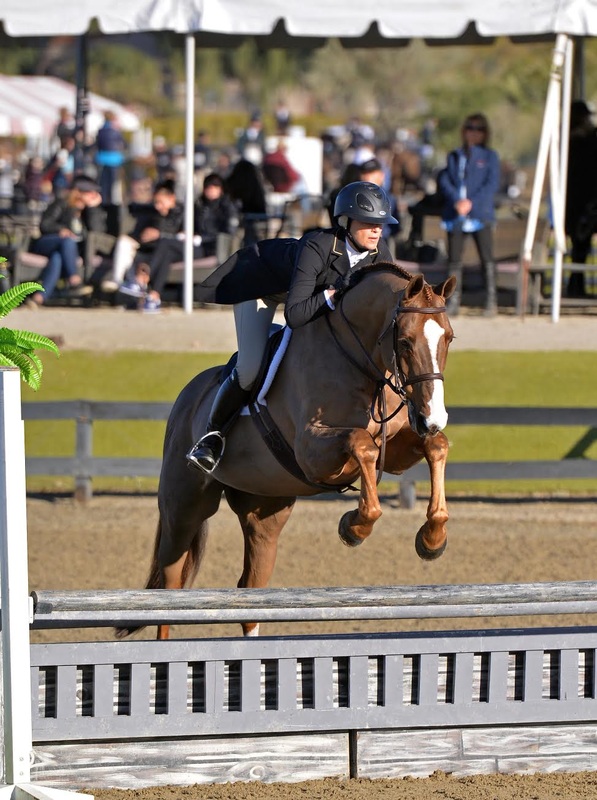
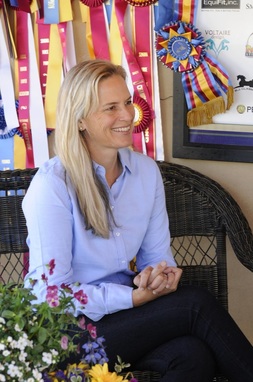
 RSS Feed
RSS Feed
